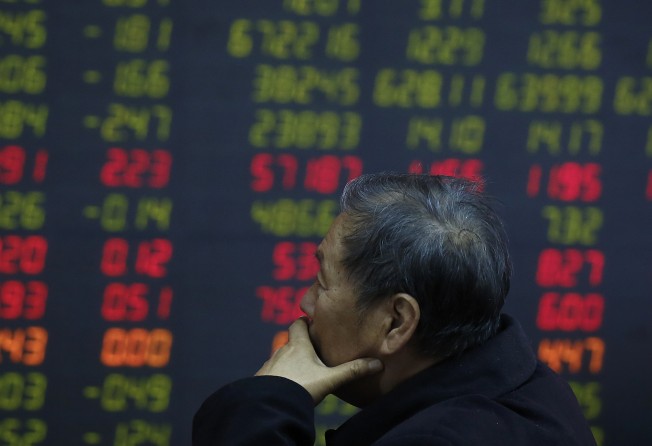Hong Kong, mainland China stocks rally after US stocks soar, but reverse gains at close on Thursday
- Hang Seng Index closes 0.3 per cent higher, while Shanghai Composite Index sheds early gains to end lower for fourth session
- Regional stocks fare better, with indices in Japan, South Korea and Australia reporting gains

A rally in Hong Kong and mainland China stocks on Thursday morning proved to be short lived. Profit-taking orders flooded the market in the afternoon as investors remain cautious over the US-China trade war, said brokers.
The morning’s rally in Asian stocks followed the US market, which soared by the most since the 1982 midterm elections, but in the afternoon different markets moved in different directions.
In Hong Kong, the benchmark Hang Seng Index was once up 1.3 per cent in morning trading but narrowed down its gains to 0.3 per cent to close at 26,227.72 on Thursday. The Hang Seng Chinese Enterprises Index was up 0.6 per cent to 10,703.59.
In China, the markets fared worse and shed their morning gains to end lower for a fourth day in a row.
The benchmark Shanghai Composite Index, which was at one point trading up 1 per cent, ended the day 0.2 per cent lower to close at 2,635.63. The CSI300, which tracks the largest stocks listed in Shanghai and Shenzhen, was down 0.3 per cent to 3,212.77. The Shenzhen Component Index fell 0.7 per cent to 7,698.02.
“There were a lot of profit-taking orders in afternoon trade, as investors wanted to cash out once the markets bounced back. There is tough resistance for the market to go up any higher, as investors are still worried about the trade war,” said Robert Lee, executive director at brokerage firm Grand Finance Group.
“The US midterm elections have ended, but there is no signal yet to show the new political environment will mean any change to US policy over trade tariffs [levied] on mainland China.”
Lee said the market would stay at current levels until the US announces any major changes in its trade policies.
Tencent Holdings rose by almost 3 per cent to HK$301.6 in the morning but narrowed its gain down to 0.07 per cent, to close at HK$293. Bourse operator Hong Kong Exchanges and Clearing rose by 2.2 per cent before narrowing its gain down to 1.2 per cent, to close at HK$227. Chinese insurance giant Ping An increased by 0.8 per cent to HK$79.20.
Apple supplier AAC Technologies was down by 7 per cent and closed at HK55.8 after reporting a lower than expected result.
Casino stocks fell. Wynn Macau was down 9.7 per cent and closed at HK$17.06 after its management issued a bearish outlook for the fourth quarter. Galaxy Entertainment was down 3.8 per cent to HK$44.25.
The regional stock markets fared better, with Tokyo’s Nikkei 225 Stock Average rising 1.8 per cent, or 401 points, to close at 22,486.92. Seoul’s Kospi was up 0.7 per cent at 2,092.63, and Sydney’s All Ordinaries rose 0.6 per cent to 6,015.90.
The regional rally followed a rise in US stocks. The technology-heavy Nasdaq was up 2.6 per cent, the Dow Jones Industrial Average was up 2.1 per cent, while the New York Stock Exchange Composite Index was up 1.6 per cent.
“Hong Kong and other Asian markets all follow the US stock markets. The election is over, and now the focus will be back on US and China negotiations on the trade war. If a solution can be found soon, the benchmark Hang Seng Index could continue its rally to test the 27,000 or even 28,000 level,” said Ben Kwong Man-bun, director at KGI Asia.
“The worst is over. We should have already seen the bottom this year, at around 24,500, and the market is likely to bounce back in the near term. The tech sector should be driving the bounce back,” said Kwong.
On the currency front, traders are waiting on the US Federal Reserve, which is meeting on Wednesday and Thursday.
“While it is widely expected the US Fed will not change the interest rate in today’s meeting, all eyes are on the statement issued after the meeting, for any prediction of interest rate rise movement,” said Jasper Lo, chief investment strategist at Eddid Securities and Futures.
“The US dollar is also likely to be weakened against other major currencies in the near term. This is because the oil price has gone down recently, which has cut down on inflation pressure in the US and, hence, the US Fed may not rush to increase the interest rate. The chance for the December Fed meeting to increase the interest rate is only at about 70 per cent,” said Lo.
The onshore yuan, traded by mainland traders, weakened by 0.1 per cent to 6.9266 per US dollar on Thursday afternoon; the offshore yuan, traded by international investors, was down by 0.09 per cent to 6.9240.
“With the stock market rally after the US midterm elections, the yuan should continue to trade at stable levels, at a range between 6.8-6.9 yuan per US dollar. Premier Li Keqiang has indicated China would like to see a stable yuan,” said Lo.
“Traders generally believe the central bank in China will use all efforts to prevent the yuan from dropping below 7 per dollar to prevent substantial capital outflow.”